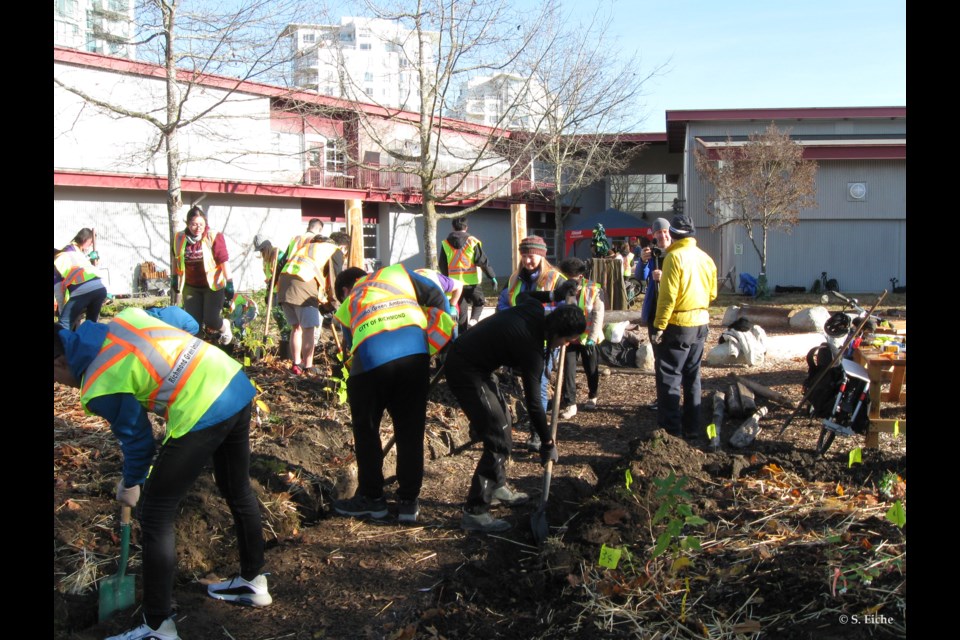In 2022, on 22 April (Earth Day) and 21 September, the Garden City Conservation Society coordinated trial experiments of planting a Miyawaki mini-forest on the grounds of Richmond Senior Secondary School. We, the board of the Garden City Conservation Society, could not have foreseen that these events would lead to the creation of the first four Miyawaki mini-forests in Western Canada over the following two years. And they were all in our community.
Actually, our Miyawaki adventure started even earlier, in June 2020, when I read an article in The Guardian by Hannah Lewis on the fast-growing mini-forests springing up in Europe (Lewis’s book, Mini-Forest Revolution, can be found in Richmond library). I told the other board members of the Garden City Conservation Society about the Miyawaki-inspired projects Lewis described, and they almost boiled over with enthusiasm. One of our directors, the permaculturist Bruno Vernier, immediately put his nose to the grindstone and took online Miyawaki training from the Netherlands, France and India. I wrote one of my columns about the Miyawaki miracle in the Richmond News in February 2021.
Then, in early 2022, a serendipitous encounter between Sharon MacGougan, our Society’s president, and the artist Jay Peachy led to Richmond Senior Secondary School becoming the site of Richmond’s first Miyawaki mini-forest. Miyawaki enthusiasm stayed on high boil. Elaine Decker and Liz Carter of Earth Literacies had read my February 2021 column and contacted Vernier. They’d been trying, without success, to plant a Miyawaki forest in Vancouver, and by February 2022 they’d joined forces with us. After the trial experiments on Earth Day and in September, planning started for a 100-metre square mini-forest at the school. In November an excavator dug the site to the prescribed depth of one metre, and a host of volunteers – including our Society, the school’s Green Team, and people from FedEx who’d provided a Tree Canada Grant – rolled up their sleeves and got planting.
Earth Day 2023 saw the creation of Richmond’s second Miyawaki mini-forest at Terra Nova Park. This time it was a collaboration between the Garden City Conservation Society and the City of Richmond, aided by a grant from Green Communities and Network of Nature. Many volunteers, of all ages, turned up. For the third mini-forest, also at Terra Nova Park, our Society worked as a community partner with the City of Richmond. Volunteers from four different Rotary Clubs helped with the planting.
Finally, in the spring of 2024, thanks to the initiative of MLA Henry Yao, the fourth mini-forest was launched in Garden City Park. Once again, our Society collaborated with the City of Richmond, and a total of 120 volunteers pitched in – first of all to pull invasives from the designated site, and three weeks later, on 23 March, to plant the mini-forest.
The principal purpose of the Miyawaki mini-forests is, of course, to contribute to the biodiversity of a place. But something else has struck me about the Miyawaki events here in Richmond, namely that there were so many people keen to embrace the idea of planting a mini-forest and that even more rallied around, willing to engage in hard physical labour. The key point here is that the Miyawaki events were the chance for lots of people to work together toward a common goal. The president of our Society has noted that there is a “joyousness” to planting tiny forests, saying “It’s really good for public engagement and conservation at the same time."
It reminds me of how people long ago would help out whenever many hands were needed, and the only payment was conviviality, plenty of fresh air, and often a hearty meal at the end. I’m thinking of barn raising, for example, or the grain harvest – epitomized by Pieter Bruegel the Elder in his painting The Harvesters (1565). While I never raised a barn or cut grain, when I lived in Italy I participated in many grape harvests, at small vineyards owned by friends or friends of friends, or even friends of friends of friends. The opportunity to work outdoors and toil alongside others, to have the satisfaction of seeing that you’ve accomplished something tangible at the end of the day, and then to enjoy a well-deserved, delicious meal – that is a big draw, I’d say.
Sabine Eiche is a local writer and art historian with a PhD from Princeton University. She is passionately involved in preserving the environment and protecting nature. Her columns deal with a broad range of topics and often include the history (etymology) of words in order to shed extra light on the subject.



